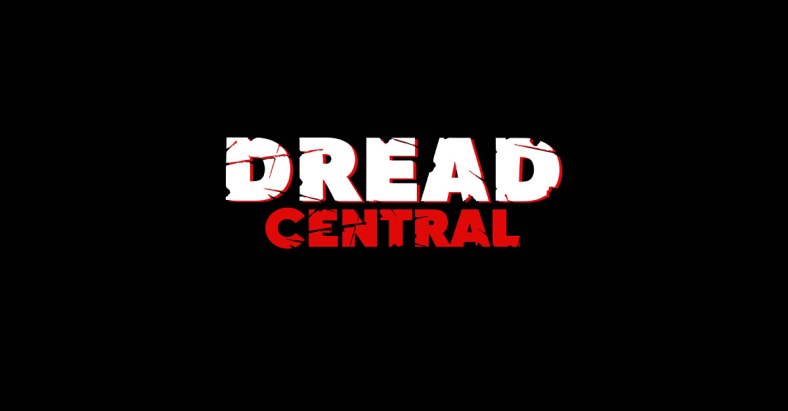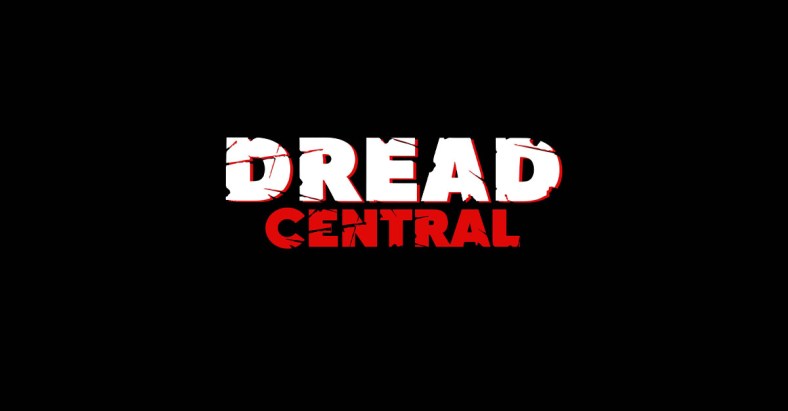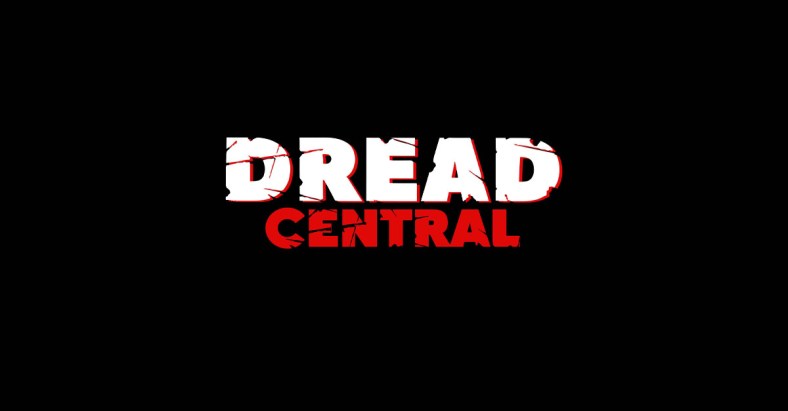Writers/Directors Star Interview: VILLAINS & Other Heroes


Criminal-lovers-on-the-run Mickey and Jules (IT’s Bill Skarsgård and It Follows’ Maika Monroe) pick the wrong house to break into in Villains, writers/directors Dan Berk and Robert Olsen’s comedic horror thriller that opens nationwide September 20 from Alter. That secluded abode happens to belong to psychopaths George and Gloria (Jeffrey Donovan and Kyra Sedgwick), who have a big secret chained in the basement…
Villains drew raves at its South by Southwest world premiere, and Dread Central caught up with Berk and Olsen (and co-star Monroe) at another festival, Lincoln Center’s Scary Movies, to talk about their home invasion flick with a difference.
Synopsis:
After a pair of amateur criminals break into a suburban home, they stumble upon a dark secret that two sadistic homeowners will do anything to keep from getting out.
DREAD CENTRAL: What were the benefits and minuses of shooting a low-budget film in mostly a single location?
DAN BERK: There’s definitely practical benefits to shooting in a single location, and overall much easier because you don’t have to worry about moving 40 to 60 people to another location if you suddenly lose where you were going to shoot that day. But it is hard. It becomes a real dance. Our first AD on this film, David Ketterer, deserves an Oscar, if they had AD Oscars, for his ability to coordinate and navigate that ballet of, “We’re working on floor one of the house.” Meanwhile, the set deck and her team are prepping for the next day’s work upstairs. Then all other random crew, set dressings, etc., are in the basement. But when we call “Action,” everyone has to stop working and then they can get 30 seconds in between takes. So, it is very challenging, especially in a single location, that’s as small as this was. This wasn’t a mansion. If we could have built the house, it would’ve been 30 percent bigger for various reasons. The challenges you’d expect, but the benefits you might not.

DC: What made you choose upstate New York as your location?
ROBERT OLSEN: We wanted it to be as remote as possible. We wanted it to be out in the woods and feel like there’s nothing around it. So, you have to obviously get a certain distance away from New York to do that. But for a film at our budget, we really needed to stay within the union zone, which begins around Times Square or Union Square and goes out like 40-something miles. If you shoot outside of that, you have to put all your crew up in hotels. We just didn’t have the money to do that. So, this is basically as far away as we could get on a union show. For the actual house itself, we looked for a long time to try to find something that worked spatially and something that had a basement that we didn’t have to build.
We were lucky enough to find a house that had an incredible, huge basement in it. And so, we were able to shoot that there as well. But it was funny because the homeowners kept the basement just spic-and-span, and we needed it to be a little bit more dirtied up. Annie Simeone, our production designer, did such a great job filling not only that basement, but that whole house. She basically went in and got all different furniture and wallpaper and all that. Since we were stuck in one location, it was really important to have it feel visually diverse enough so that you don’t get bored watching it. And so, the color palette is different in every room, which was a really important factor to us. But it was also just great being up that far north and shooting up there. We shot a lot of things in the city and whatnot, and there are positives and negatives, but it was great because Dan’s parents live 15 minutes away. So, he and I just stayed there the whole time, and it was unbelievable as his mom was up with us every morning at 5. It was like being back in high school.

DC: Your actors get some wonderful monologues in the movie. Is that what attracted such a great cast?
MAIKA MONROE: I loved the script as a whole. It was incredibly refreshing to read. I read a lot of scripts, and there are certain ones that just stick out. And [Villains’] characters and the characters’ relationships are what I really fell in love with.

RO: [With the characters] it was along those same lines of keeping all the rooms visually interesting because you’re in one place. Well, the other thing is, what type of movie are you going to try to tell here? And it has to be something dialogue-driven. It has to feel like a play almost, because if it were all just wordless set pieces of people trying to escape and things like that, it would probably be 45 minutes long and not be quite as interesting. This is more of a movie about exploring this situation, its characters and letting them have a real voice. We always like dialogue-heavy movies. That’s half the fun of writing. We give credit to all the actors to be able to pull that off, sometimes on back-to-back days, having this huge three-or-four-or-five-page dialogue scene.
DC: I like the fact that you don’t whitewash Mickey and Jules, these junkie criminals on the lam.
RO: The moral relativism was the core of the initial idea. It was like, “How far can we push two characters before the audience snaps and stops liking them?” And that’s why we always talked about movies like Natural Born Killers, True Romance, Badlands and all these lovers-on-the-run movies. Some of them maintain sympathy with the couple and some of them lose sympathy, like Natural Born Killers. You’re not onboard by the end of that movie with what’s going on anymore. So, we were like, “OK, this will be fun. How many transgressions can we show onscreen?” So, we show some drug use, which is typically code for “These are bad people.” But we wanted to show that these were people who were in love. After the robbery, we very deliberately go to the car wash scene, where by that point, you should, if you have a beating heart, love these characters. You’re like, “Oh they’re in love. They’re great. They must have a good reason for doing that robbery.” But then we hit you with them doing too much coke. That was the great fun of drawing these characters initially and then watching them come to life. And that went a lot into our casting decisions, because we needed people from the start who were as lovable as possible. And Maika and Bill both have that.
DC: Maika, did you enjoy the opportunity to play comedy?
MM: Hell, yeah. It’s really fun, and there was really good energy on set. We had a blast. It was great. It was so fun. I love comedy. There are obviously some really intense scenes, but some really fun scenes too.
RO: With both Maika and Bill, we hadn’t really seen them do [a film like] this. We were bracing to have to direct them more to be funny, but they were so funny right out of the gate. It was crazy that they hadn’t been cast in roles like this before. That’s where we got really excited. We still draw the most pride from when we hear or read a review that says, “I didn’t know Bill Skarsgård or Maika Monroe were capable of pulling off this kind of role.” That’s the greatest praise that we can imagine. With this type of comedy, it’s all just acting, and a lot of the best comedic actors are just really good actors too. That’s something that Bill and Maika already had going in, and we just gave them this situation to play in.
DC: Micah, were you offered many horror films after It Follows?
MM: I definitely read a lot. There were some good ones and a lot of bad ones. This was something different. Obviously, some horror elements, but the characters were just so fascinating to me.
DC: There are some very funny comical bits, asides almost, like Mickey holding the butter knife as a weapon.
DB: A lot of those were creations that Micah, Bill and Jeff Donovan brought on the day. A lot of little tics and mannerisms. If memory serves, the entire wink thing was Bill’s idea. We didn’t even have the wink in there.
RO: And the butter knife is a good example where the beat of him saying, “Oh, it’s just butter knives in here? What, these people not eat steak?” That was in the script, but we didn’t have him actually holding the knife. That was him. And it was great going in and finding those moments. It’s tough because, once you get on set, there’s such pressure to be as efficient as possible, to get everything done as quickly as possible. But you never know what could happen when you have to go back if a take doesn’t work or something. Part of the fun of making movies is that it’s always changing on the fly. We have to just adjust with it.
DB: And it’s the little teeny things that probably nobody else notices. When they first go into the basement, they hold their noses. That was in the script. But Bill doing this [unscripted] thing with his fingers to her shows their relationship is stronger because we’ve seen that. It’s just a good example of how actors can elevate your script so much.
DC: It seemed like Jeffrey Donovan was channeling Kevin Spacey. Was that intentional?
DB: Don’t say that [laughs]. He came in and really built that character with just plucking from a lot of elements that we didn’t even give him. And that’s another example of an actor bringing something to it. He came in on the first day that we’d met him with that mustache, and we were like, “Oh wow!” And wearing the ascot, this really flamboyant crazy thing, that was not our idea at all. Our costume designer, Stacey Berman, asked us, “Guys, can I talk to you for a second? Jeffrey wants to wear an ascot.” And we didn’t even know what an ascot was! We saw it, and it was fine. And his accent…he was like, “So I’m thinking of doing this middle class, lower Louisiana dialect. But when I get really angry, I’ll switch to a lower class, super-bayou-sticks Louisiana accent.” And we were just like, “Dude, that all sounds great. You’ve got to do that.” Jeffrey really built it from all those different disparate pieces. That was really cool.
RO: Both George and Gloria were designed to be these sociopaths who wear the skin of old film stars, their reality being like a Clark Gable thing. Jeff just got that from the word go. And he was constantly referencing older films and older actors. It was a blast finding that.
DC: I love the scene where Jules holds Gloria’s “baby” hostage by hanging it over the balcony. What was it like shooting that scene?
MM: It was hard. It was hard getting that doll to smash. The space we were shooting in was very tight.
RO: The shooting space was tall and thin. So, there were only so many places to put the camera, and then where you put the camera is right where you want to throw the baby… That whole sequence was just one of those things that Dan and I had plotted out in our heads. Nobody else understood the structure of the shots we were getting. Even Matt Mitchell, our DP, who’s usually in our brains with us, was like, “Guys, I really hope you got it figured out.”
DB: No one knew what the fuck was going on. It was really hot. That location was too tight, like 25 percent too small to actually be shooting a scene there.
RO: And yet it was a great illustration of how the process works because after that day, we were like, “Oh man, that sucked. That was so tough.” And then we went in, saw the footage and we were like, “Oh, my God, it’s going to work.” And now it’s one of our favorite scenes in the movie. But it’s funny because if you ask people who were actually working there that day, they would say, “That foyer is my hell!”
DC: As co-writers and co-directors, how do you divide the work?
DB: It’s just some natural organic thing. Nothing’s clearly delineated.
RO: The writing is easier because there actually is a system where we outline everything together, and then one of us will write the first act and then hand it off to the other person. They will rewrite the first act and then write the second act, hand it off to the other person who will rewrite those two acts. And then by the third act, hand it to the other person who will rewrite the whole movie. And then we just keep going back and forth. And by the end of the process, you totally forget whose idea, what line was…
DB: When somebody sees our first draft internally, it’s more like our fourth or fifth draft. So that tends to be a good check on quality control. Bobby and I have just been working together and been best friends for so long that, once we get on set directing, we’re of one mind. So, after a take, we look at each other for a moment to decide if it worked. Then after a while, we split off. And I’ll talk to the actors, and he’ll talk to Matt the DP or the art department. Or vice versa.
RO: We’ve gotten really good at knowing what issues are gonna come up that will require decisions and knowing which decisions we might have two different ideas about. And so, we try to just have that discussion before getting to set on the night before a shoot day. We’ll go through every scene and pretend we’re shooting it there. “What are we going to do if they give us the line this way?” We can try to mine anywhere where we might have a creative disagreement so that we can have that discussion beforehand and not waste everybody’s time on set. That’s the thing that we’ve gotten a lot better at from our first film.
DC: Maika, what was it like having two directors?
MM: It was great. I never felt like there was ever an issue having two people. If anything, it made the process a lot quicker on set. I don’t know how you guys do it, but your brains are somehow [connected]. They were just always on the same page, and I always felt that it benefited the film having two people on it.
DC: Home invasion horror films are so popular these days. Why do you think that is?
DB: I don’t know why things trend the way they do. Sometimes you have a successful movie, and every producer and writer in town chases that trend. The Strangers was really good. It was a hit. People were like, “Ooh, that’s scary, the idea of a home invasion.” For the record, we wrote our script before Don’t Breathe came out. Then every producer was like, “We want Don’t Breathe.” And that was actually a problem for us because Villains is not Don’t Breathe. If you read Villains with Don’t Breathe glasses on, you’re like, “So it’s horror, right? It’s a thriller, it’s super dark?” But then we’d say, “No, it’s not.” People always want to put you in various boxes.
RO: There are lots of older films like Funny Games [out there], so we certainly never felt like we were inventing anything with the scenario that we put these characters in. It was more about the uniqueness would come from the characters themselves and the tone of the movie, not necessarily the setup. And that made the project an interesting thing to pitch because the elevator pitch—“It’s these two criminals breaking into a house and finding a little girl in the basement”—doesn’t seem like that novel of an idea or of a setup. And so, it was always like, “Read the script, you’ll see what we mean. Read the script.” And you give them another image, and people immediately get this really icky idea in their head: “A little girl chained up in the basement…” “But it’s a comedy.”
MM: Yeah, it’s funny!
DC: What’s next for everybody?
RO: We’re on a couple of writing projects right now, but can’t say too much.
MM: It’s so sick.
RO: They’re all genre films.
DC: Maika, what’s in your future?
MM: I have no idea. I’d have to see. Hopefully something with these guys.
Categorized:News

